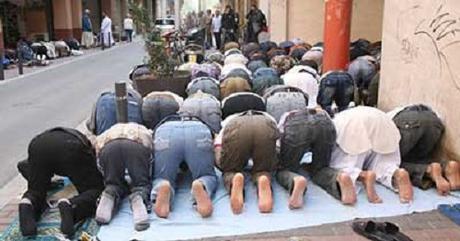
In May 2015, the Center for Security Policy (CSP) commissioned two successive nationwide polls of Muslims living in the United States.
The results of the polls are nothing less than alarming. In CSP’s words:
“significant minorities embrace supremacist notions that could pose a threat to America’s security and its constitutional form of government.”
The polls found that U.S. Muslims hold beliefs that are very different than the general U.S. population. Here are the findings of the second poll:
- 51% of Muslims believe that “Muslims in America should have the choice of being governed according to shariah.” When that question was put to the broader U.S. population in an earlier national poll, the overwhelming majority (82%) said shariah or Islamic law should not displace the U.S. Constitution.
- Only 39% of the Muslims polled believe Muslims in the U.S. should be subject to American courts. In contrast, 92% of the broader U.S. population think Muslims should be subject to the same courts as other citizens, rather than have their own sharia courts and tribunals.
- Nearly a quarter of the Muslims polled believe that “It is legitimate to use violence to punish those who give offense to Islam by, for example, portraying the prophet Mohammed.” In contrast, 63% of the broader U.S. population say that “the freedom to engage in expression that offends Muslims or anybody else is guaranteed by the U.S. Constitution and cannot be restricted.”
- Nearly one-fifth of Muslims polled said that the use of violence in America is justified in order to make shariah the law of the land in the U.S.A.
Center for Security Policy’s president, Frank J. Gaffney, Jr., observed:
The findings of the Center for Security Policy’s survey of Muslims in America suggests that we have a serious problem. The Pew Research Center estimates that the number of Muslims in the United States was 2.75 million in 2011, and growing at a rate of 80-90 thousand a year. If those estimates are accurate, the United States would have approximately 3 million Muslims today. That would translate into roughly 300,000 Muslims living in the United States who believe that shariah is “The Muslim God Allah’s law that Muslims must follow and impose worldwide by Jihad.” It is incumbent on the many American Muslims who want neither to live under the brutal repression of shariah nor to impose it on anybody else to work with the rest of us who revere and uphold the supremacy of the U.S. Constitution in protecting our nation against the Islamic supremacists and their jihad.
Below are 13 differences between sharia and the American court system (from The American Catholic):
1. Sharia courts do not generally employ lawyers; plaintiffs and defendants represent themselves.
2. Trials are conducted solely by the judge, and there is no jury system.
3. There is no pre-trial discovery process, no cross-examination of witnesses, and no penalty of perjury (on the assumption that no witness would thus endanger his soul). Unlike common law, judges’ verdicts do not set binding precedents under the principle of stare decisis and unlike civil law, Sharia does not utilize formally codified statutes.
4. Instead of precedents and codes, Sharia relies on medieval jurist’s manuals and collections of non-binding legal opinions or fatwas, issued by religious scholars (ulama and mufti); these can be made binding for a particular case at the discretion of a judge.
5. Sharia courts’ rules of evidence prioritize oral testimony and exclude written, documentary, forensic and circumstantial evidence, on the basis that it could be tampered with or forged.
6. A confession, an oath, or the oral testimony of a witness are the only evidence admissible in a Sharia court; written evidence is only admissible with the attestations of multiple, witnesses deemed reliable by the judge, i.e. notaries.
7. Testimony must be from at least two witnesses, and preferably free Muslim male witnesses, who are not related parties and who are of sound mind and reliable character; testimony to establish the crime of adultery must be from four direct witnesses.
8. Forensic evidence (i.e. fingerprints, ballistics, blood samples, DNA etc.) and other circumstantial evidence is rejected in hudud cases in favor of eyewitnesses, a practice which can cause severe difficulties for women plaintiffs in rape cases.
9. Testimony from women is given ¼ to ½ the weight of men; testimony from non-Muslims may be excluded altogether (if against a Muslim).
10. In lieu of written evidence, oaths are accorded much greater weight and are used as evidence.
11. Plaintiffs lacking other evidence to support their claims may demand that defendants take an oath swearing their innocence, refusal thereof can result in a verdict for the plaintiff.
12. Sharia courts, with their tradition of pro se representation, simple rules of evidence, and absence of appeals courts, prosecutors, cross examination, complex documentary evidence and discovery proceedings, juries and voir dire proceedings, circumstantial evidence, forensics, case law, standardized codes, exclusionary rules, and most of the other infrastructure of civil and common law court systems, have as a result, comparatively informal and streamlined proceedings.
13. This can provide significant increases in speed and efficiency, but at the cost of the safeguards provided in secular legal systems.
H/t WND
~Éowyn

